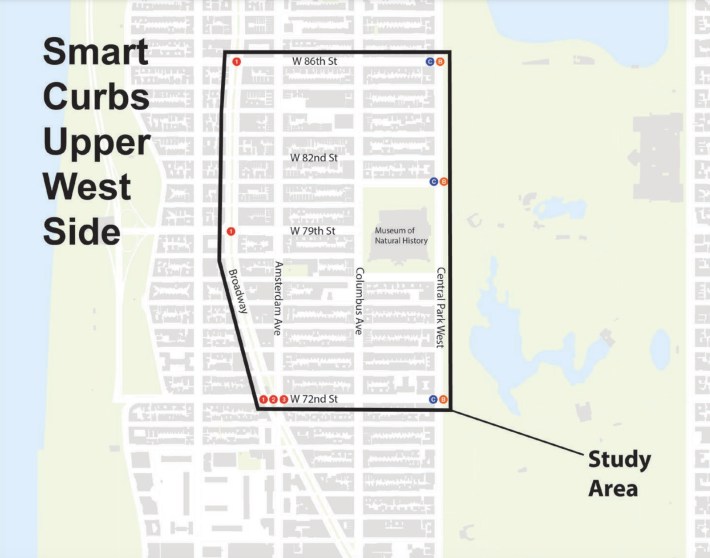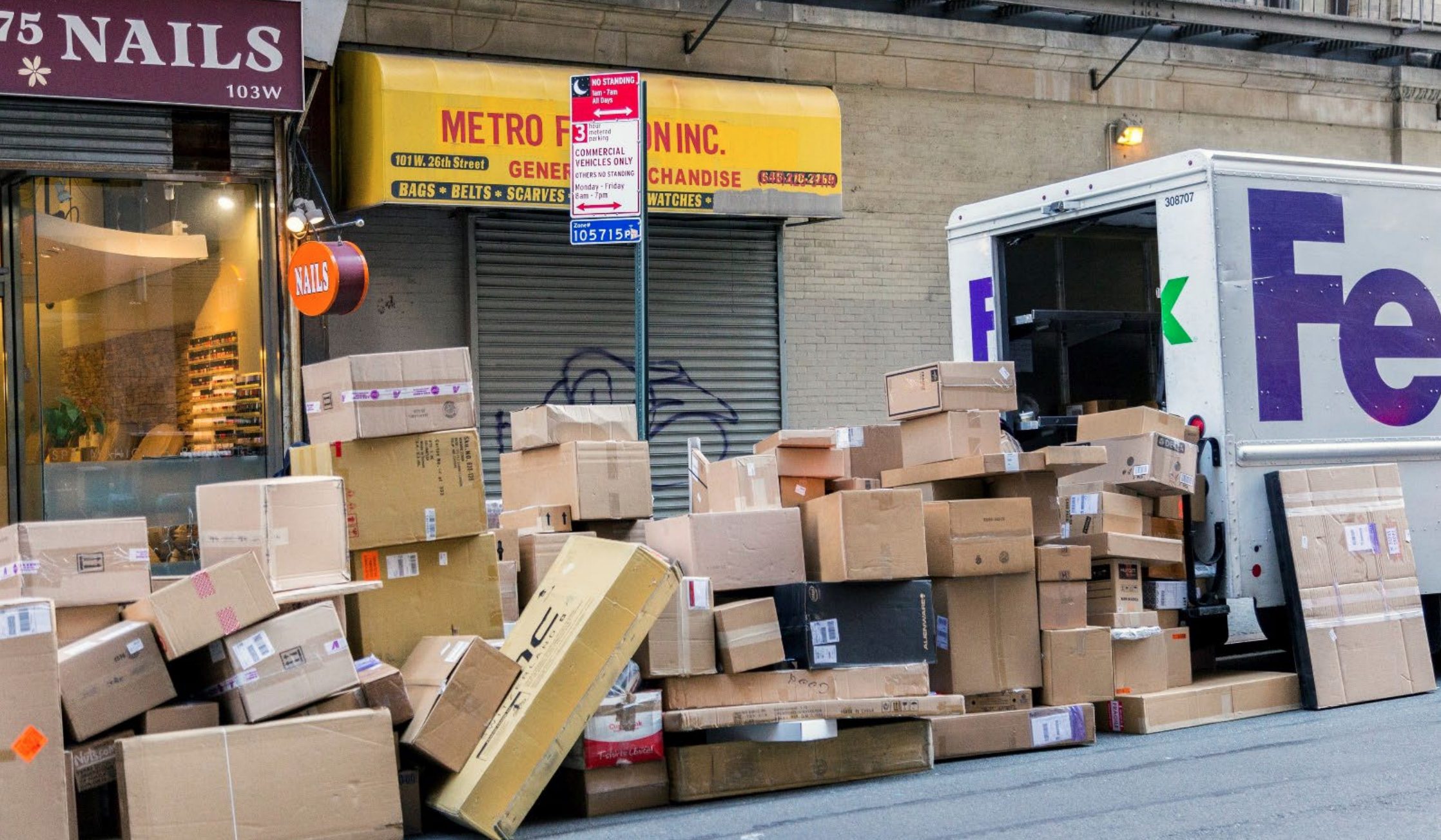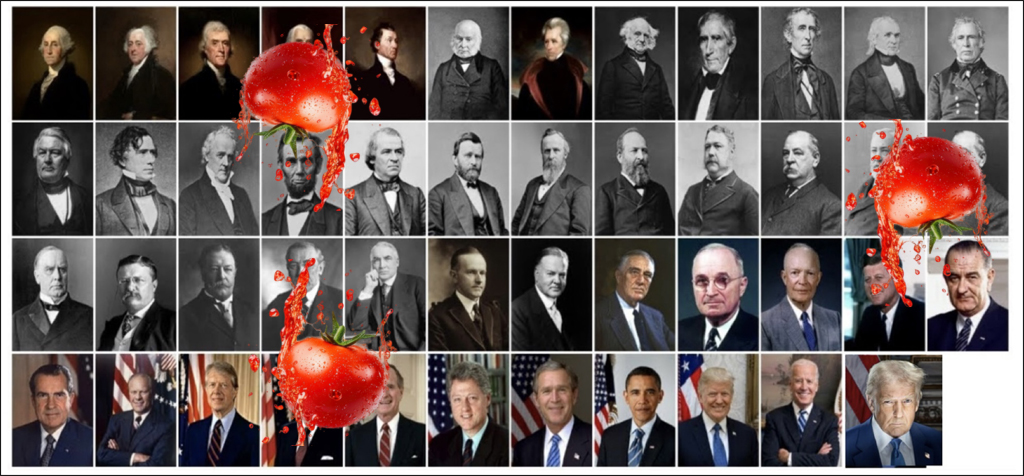The city's will turn about 10 percent of free car storage into paid parking, and make some other tweaks to the streetscape as part of a curb-reform pilot on the Upper West Side, but experts and locals urged transportation officials to be bolder to bring the Big Apple's road space into the 21st century.
Last week at a community meeting, the Department of Transportation unveiled its long-awaited "Smart Curbs" plan [PDF], covering a roughly 14-block section uptown, where officials plan to meter 175 parking spots that are currently free — out of the roughly 1,700 automobile storage spaces that drivers get to use gratis in one of the most densely populated and expensive neighborhoods in the United States.
"They’re just nibbling around the edges of problems with parking on the Upper West Side," said Donald Shoup, author of the influential book "The High Cost of Free Parking," and a professor at the University of California Los Angeles.

The DOT pilot covers the area bounded by W. 72nd and W. 86th streets, and Central Park West and Broadway, and looks at ways to use the curb for a wider benefit than just letting people park their private vehicles there — in a part of the city where nearly three-quarters of households don't have a car.
Officials launched the project last year as making the Upper West Side the first neighborhood to have its curbs "meet 21st-century demands," hoping to address rampant double-parking and messy situations due to an increase in online ordering and delivery drivers unloading packages in the street, as the sidewalk-adjacent lanes remain packed with private cars that don't move much throughout the day, a rep told Manhattan Community Board 7's Transportation Committee in a presentation on Tuesday.
"The way that the curb lane has been used has been changing rapidly," Jonathan Hawkins, DOT's coordinator on smart curbs, told the civic group. "Just a lot of competition for extremely limited space."
Starting this year and into 2025, the project will install 120 new commercial metered parking spot and 80 "net" passenger vehicle metered spaces, along with 23 loading zones, three "microhubs" for unloading freight in dedicated curb spaces, five bike corrals and EV charging spots, and one painted curb extension with seating, also known as a "street seat," at 72nd and Columbus Avenue.
The agency also plans to separate the dangerous "mixing zones" tangle of turning vehicles and the bike lanes at intersections along Columbus and Amsterdam Avenues "where feasible," and rethink the Central Park West Bike Lane, which is frequently blocked by drivers.
Shoup called on DOT to price more of the transit-rich area's parking at market rates, which would free up more curb space and source more revenue to turn it into something better than parking.
One way to do that would be to create so-called parking benefit districts, where the money from meters goes back to into the community where they are, unlocking goodies for a broader section of residents and visitors than just the car-driving class, such as transit passes, street trees, and redesigns.
It's a well-established policy the scholar has advocated for the neighborhood in these pages, and which other cities have adopted for more than half a century, and could help New York discourage driving and improve public transportation with the extra revenue.
"Given the catastrophe of the congestion pricing fiasco, this is something the city could do," Shoup said.
Mexico City has had parking benefit districts since 2011, dedicating the revenue for public space improvements in the areas where it sets up the meters, while some of London's boroughs use just a fraction of the parking income to fund free transit passes for seniors and people with disabilities. Even car-loving Houston has it!
The city could even earmark the money for specific upgrades like free transit rides, which would also speed up its buses as fewer drivers circle around looking for free parking, Shoup argued.
"The MTA and DOT have everything to gain from charging market prices for curb parking and using the money to give everybody a free transit pass," the urban planning academic said. "There is the common view in New York that you’re the center of the world and that what goes on elsewhere is uninteresting. I think you’re ignoring what is working well in other cities."
Under current law, however, all parking payments must go to the city's general fund, according to DOT spokesman Vin Barone.
Shoup wasn't the only person seeking a bolder plan. Uptowners said the smart curbs plan was a first step, but also demanded more.
DOT should put at least one loading zone on every block, including on residential side streets, where delivery drivers double parking on the narrower strips and routinely block traffic, one Community Board 7 member said at the June 11 meeting.
"Cross streets can easily be shut down completely by one delivery. It’s not safe, it’s not smart, it’s just a terrible situation, and this plan does not address that at all," said Howard Yaruss. "People’s lives depend upon the ability for an ambulance to get to them right now."
The three microhubs — one of which DOT plans to do this year — are also not nearly enough, said Carl Mahaney, director of StreetopiaUWS, a part of Open Plans, which is Streetsblog's parent company.
"There’s going to be these three and there’s going to be another dozen doing it illegally across the neighborhood," he said. "That one feels more like a gesture to me than like a material improvement."
Delivery companies park illegally more often in part because the city bizarrely gives shipping giants like Amazon and UPS discounts on tickets in exchange for them agreeing not to contest the violations in court.
Hawkins, of DOT, said the agency will draft agreements with delivery companies to only use the microhubs if they're dropping off nearby, or risk losing the sanctioned spots.
"The companies would be agreeing that within a certain radius of the micro hub they are not going to be doing this behavior illegally, and if that does happen, they would lose the microhub," he said. "We’re trying to create some incentive to get rid of this chaotic behavior."






